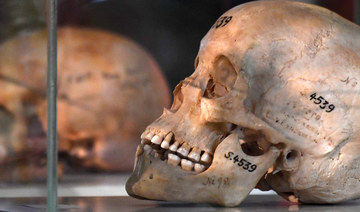
Faith Nyasuguta
The revelation of the British auction house, The Saleroom, showcasing a significant collection of Egyptian antiques for sale has captured widespread attention.
While such auctions are not uncommon, the inclusion of 18 relics described as old Egyptian human skulls has ignited a fervent debate regarding the ethics surrounding the trade of human remains.
These skulls are reported to have originated from the collections of Augustus Henry Lane Fox Pitt Rivers, a prominent figure in the 19th century known for his extensive collection of artifacts, including weaponry, ceremonial objects, jewelry, and human remains.
Among the skulls on offer, there are ten male, five female, and three of unknown gender, each with a unique historical significance. Dating back to 1550-1292 BC and originating from the region of Thebes, these skulls offer a glimpse into the ancient civilization’s practices and rituals from over 3000 years ago.

The pricing of these relics, ranging from £200 to £300 (approximately $250 to $380), has raised eyebrows and prompted inquiries into the legality and morality of trading in human remains. Experts and scholars have voiced concerns about the implications of such transactions, questioning whether they uphold ethical standards and respect for human dignity.
Dan Hicks, a museum specialist, expressed his dismay upon discovering the skulls for sale, emphasizing the importance of periodically reassessing ethical considerations in the field of archaeology and artifact trade. He remarked, “Every generation or so, surely we need to check in on our ethical compass on these questions and just ask, is this really right?”
Laura Van Broekhoven, director of the Pitt Rivers Museum, echoed these sentiments, expressing surprise and disappointment at auction houses’ continued involvement in such practices. She emphasized the need to cease the sale and commodification of human remains, particularly those belonging to communities with established rituals and traditions for honoring their ancestors.
Amid the controversy surrounding the auction, there have been recent developments in the efforts to preserve and protect Egyptian antiquities. The Egyptian Ministry of Tourism and Antiquities announced the successful recovery of a 3,400-year-old relic stolen from the country several decades ago. The artifact, a statue of Ramesses II, an esteemed pharaoh of Ancient Egypt’s nineteenth dynasty, was reportedly looted over three decades ago and recently retrieved from Switzerland.

This recovery serves as a testament to ongoing endeavors to repatriate stolen antiquities and safeguard Egypt’s rich cultural heritage. It emphasizes the importance of responsible stewardship and ethical practices in the management of archaeological treasures, ensuring their preservation for future generations to appreciate and study.
RELATED:





1 Comment
This is deeply disturbing. Displaying human remains and selling them for profit …. that speaks volumes.